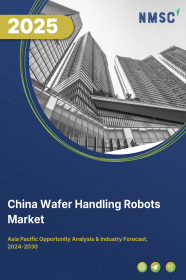
China Wafer Handling Robots Market by Product Type (Vacuum Wafer Handling Robots and Atmospheric Wafer Handling Robots), by Number of Arms (Single Arm and Dual Arm), by Robot Type (Linear Robots, SCARA Robots, Articulated Robots, Cylindrical Robot, and Others), by Operation (Motor Driven and Belt Driven), by Installation (Free Standing and Integrated), by End Use (Integrated Device Manufacturer (IDM) and Foundries) –Opportunity Analysis and Industry Forecast, 2024–2030
Industry: ICT & Media | Publish Date: 15-Feb-2025 | No of Pages: 169 | No. of Tables: 132 | No. of Figures: 97 | Format: PDF | Report Code : IC2084
US Tariff Impact on China Wafer Handling Robots Market
Trump Tariffs Are Reshaping Global Business
China Wafer Handling Robots Market Overview
China Wafer Handling Robots Market size was valued at USD 240.1 million in 2023, and is predicted to reach USD 436.3 million by 2030, at a CAGR of 8.2% from 2024 to 2030. Also, the market size was 7479.0 units in 2023, and is predicted to reach 19053.0 units by 2030, with a CAGR of 13.4% from 2024 to 2030.
A wafer handling robot represents a specialized robotic solution designed to streamline the complex procedures inherent in semiconductor manufacturing. These robots demonstrate exceptional proficiency in executing precise movements and positioning tasks with fragile semiconductor wafers. Their significance lies in their pivotal role in the creation of top-tier integrated circuits and microelectronic devices.
Operating within pristine cleanroom environments, they incorporate a diverse range of end effectors, sensors, and vision systems to securely grasp, inspect, and manipulate wafers, all while mitigating the risks of damage or contamination. By seamlessly integrating with other fabrication equipment, these robots not only boost operational efficiency and minimize errors but also foster the consistent production of cutting-edge semiconductor technologies that power an extensive array of contemporary devices.
Government Support and Industrial Policy Initiatives Drives the China Wafer Handling Robots Market Growth
China's semiconductor sector benefits from strong government support and strategic industrial policy initiatives aimed at achieving technological supremacy. The Chinese government has set ambitious targets to bolster domestic semiconductor production, in line with broader political visions, such as attaining technological supremacy by 2049.
Initiatives like "Made in China 2025" underscore the importance of semiconductors in China's industrial strategy, aiming to significantly increase chip production to meet domestic demand.
This emphasis on semiconductor production drives the demand for advanced automation and robotics, including wafer handling robots, to enhance manufacturing efficiency and maintain competitiveness on a global scale.
Robust Growth in Semiconductor Market Fuel the Growth of the Market
According to Semiconductor Industry Associations, China's semiconductor market has experienced significant growth, reaching an annual revenue of $39.8 billion in 2020, with a remarkable growth rate of 30.6%. Despite accounting for only 3.8% of global chip sales, China's semiconductor sector is rapidly expanding.
This growth is further bolstered by substantial investments in semiconductor manufacturing, as evidenced by the announcement of 28 new fab construction projects with a combined funding of $26 billion in 2021.
This robust expansion in chip sales and manufacturing activities is closely linked to strong government support and aligns with China's ambitious objectives to strengthen its domestic semiconductor production.
High Initial Cost Restrains the Market Growth
The substantial expense associated with wafer handling robots poses a significant hurdle to wafer handling robots market expansion. The upfront investment necessary to procure, integrate, and sustain these advanced automation systems represents a considerable financial challenge for companies, particularly those with constrained budgets. This financial barrier has the potential to dissuade prospective adopters from entering the market or scaling up their automation capabilities.
Incorporation of Advanced Technologies such as Computer Vision and AI to Enhance Precision
Incorporating cutting-edge technologies such as Artificial Intelligence (AI), computer vision, and the Internet of Things (IoT) into robots presents extensive opportunities for market expansion.
These integrations empower wafer handling robots to streamline processes, increase operational efficiency, and enable predictive maintenance. AI algorithms play a vital role in refining robot movements, improving quality control by identifying defects in real-time, and predicting maintenance needs.
Computer vision ensures accurate handling of wafers and precise object recognition, even in complex operational settings, while IoT connectivity enables real-time monitoring, data exchange, and predictive maintenance, thereby reducing downtime.
Additionally, advanced safety features, data analytics capabilities, and enhancements in energy efficiency further underscore the importance of wafer handling robots as indispensable assets within the dynamic semiconductor manufacturing landscape.
Competitive Landscape
China wafer handling robots industry comprises various market players, such as include Kawasaki Heavy Industries, Ltd., Nidec Instruments Corporation, Yaskawa Electric Corp., RORZE Corporation, DAIHEN Corporation, Hirata Corporation, Rexxam Co., Ltd., KUKA AG, ULVAC, Inc., and Stäubli International AG.
China Wafer Handling Robots Market Key Segments
By Product Type
-
Vacuum Wafer Handling Robots
-
Atmospheric Wafer Handling Robots
By Number of Arms
-
Single Arm
-
Dual Arm
By Robot Type
-
Linear Robots
-
SCARA Robots
-
Articulated Robots
-
Cylindrical Robot
-
Others
By Operation
-
Motor Driven
-
Belt Driven
-
Stainless Steel Belts
-
Rubber Belts
-
Polymer Belts
-
By Installation
-
Free Standing
-
Integrated
By Wafer Size
-
Up to 100 mm
-
150 mm
-
200 mm
-
300 mm
-
Above 300 mm
By Semiconductor Process
-
Oxidation (Deposition)
-
Lithography
-
Etching, Cleaning, Polishing
-
Inspection & Testing
-
Assembly & Packaging
By End Use
-
Integrated Device Manufacturer (IDM)
-
Foundries
REPORT SCOPE AND SEGMENTATION:
|
Parameters |
Details |
|
Market Size in 2023 |
USD 240.1 Million |
|
Revenue Forecast in 2030 |
USD 436.3 Million |
|
Growth Rate |
CAGR of 8.2% from 2024 to 2030 |
|
Market Volumes in 2023 (units) |
7479.0 |
|
Volumes Forecast in 2030 (units) |
19053.0 |
|
Growth Rate |
13.4% |
|
Analysis Period |
2023–2030 |
|
Base Year Considered |
2023 |
|
Forecast Period |
2024–2030 |
|
Market Size Estimation |
Million (USD) |
|
Growth Factors |
|
|
Companies Profiled |
10 |
|
Market Share |
Available for 10 companies |
|
Customization Scope |
Free customization (equivalent up to 80 working hours of analysts) after purchase. Addition or alteration to country, regional, and segment scope. |
|
Pricing and Purchase Options |
Avail customized purchase options to meet your exact research needs. |
KEY PLAYERS
-
Kawasaki Heavy Industries, Ltd.
-
Nidec Instruments Corporation
-
Yaskawa Electric Corp.
-
RORZE Corporation
-
DAIHEN Corporation
-
Hirata Corporation
-
Rexxam Co., Ltd.
-
KUKA AG
-
ULVAC, Inc.
-
Stäubli International AG

















 Speak to Our Analyst
Speak to Our Analyst





















